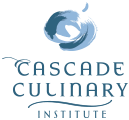Student-Centered Culture
Competency Based Learning
Cascade Culinary Institute® (CCI) is committed to providing high-quality and nurturing instruction throughout the student academic experience. Students will be exposed to competency-based curriculum that is supported by daily assessment throughout the instructional process. Our curriculum is supported by written and practical examinations in each lab-course, along with a master practical exam at the conclusion of the first and second year learning experience. CCI faculty offer instruction that is focused on the following themes:
- Mastery of core competencies as defined by the American Culinary Federation Foundation’s Accrediting Commission
- Integrated leadership skill development
- Communication and group dynamics
- Applied restaurant systems and operations
- Critical thinking
For competency-based applied learning activities, students are assessed in the areas below. Students are also assessed on how they perform on written assignments, quizzes, projects, applied leadership skills, and practical/written examinations.
- Food Safety and Sanitation
- Organization
- Professionalism
- Applied competency base learning activities
Engaged Culinary Instruction
Unlike other culinary schools, CCI is committed to maintaining an average student-to-instructor ratio of 18:1 in all laboratory courses over the duration of the Program. CCI’s Instructors are highly-regarded and possess a significant amount of industry experience, which serves as a foundation to their advanced skills. Faculty are committed to supporting the student learning experience through access during office hours and “Open Labs”, which serve as a venue in which students can practice competencies outside of their assigned coursework under the supervision of an experienced Lab Assistant.
Students are encouraged to engage in critical thinking throughout their education. While fostering the spirit of inquiry in the learning process, students are also asked to share how the course content correlates with either past or current industry work experience. Connecting and synthesizing content from course-to-course, while also asking the “why’s” during the competency-based applied learning exercises is highly encouraged. Lastly, students are encouraged to continually map the relationship with what they are learning in class with that of their career aspirations. Student learning is balanced between rigorous instruction that outlines culinary theory and that of applied learning and skill development that is concluded with assessment and written/practical testing. The primary goal is to provide a high quality education that will translate into student confidence and know-how that will support a sustainable career within the hospitality industry.

